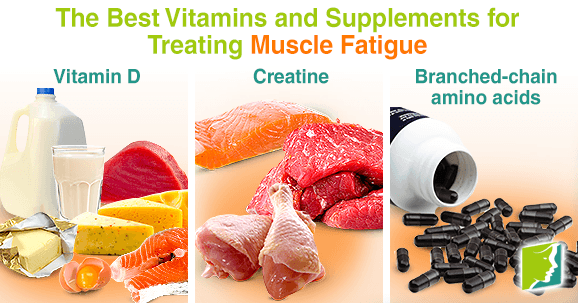You've rested, but still spend the day in a haze; your muscles ache, but you haven't participated in heavy activity. Fatigue is a common symptom during the early stages of the menopause transition. It has far-reaching consequences, and affecting the performance of the muscles is no exception. Muscle fatigue can manifest itself through pain, soreness, or a general feeling of lethargy in the body. Consider the following vitamins and supplements to help battle the effects of a tired body.
Vitamin D
A deficiency in vitamin D is a well-recognized cause of fatigue and myopathy, the official term for muscle-related disease. It is stored in the liver, as well as fat and muscle tissue. Studies have been conducted linking the underperformance of skeletal muscle with vitamin D deficiency, and it is also thought to have positive effects on energy production.
Fortunately, you don't necessarily have to consume anything in order for the body to get vitamin D. Simply going outside and soaking in some sun for 10 - 15 minutes, three times per week will allow the body to convert ultraviolet rays into a healthy boost of vitamin D.
For those living in a location or season with more unfortunate levels of sunshine, fear not. Vitamin D can be found in fortified milk, cheese, butter, fatty fish, and egg yolks. Otherwise, you can easily purchase vitamin D supplements at your local store.
Creatine
Creatine is a naturally-occurring substance and is most commonly found in meats, especially chicken and fish. When consumed, the body converts it to phosphocreatine, which is then stored in the muscles to be used as energy later.
One of the best-selling and most well-documented supplements for improving athletic performance, creatine has the most scientific support compared to all other sport supplements, though could still benefit from further evidence. However, preliminary studies suggest that it helps redress the effects of lost muscle strength, as well as reduce fatigue and increase overall strength. Studies have even shown positive effects of creatine on muscle endurance in the elderly.
Creatine has also given hope to those seeking to improve mental function, particularly after a deficit of sleep. This could certainly come in handy for women suffering from restless sleep or insomnia during menopause - an exhausting double whammy when combined with tired muscles.
Branched-chain Amino Acids
Branched-chain amino acids or BCAA are specifically involved in the body's biochemical muscle processes. Several studies have been performed on them, especially in light of the potential benefits they could have in the sporting world, and conclusions are optimistic. Those who have taken a BCAA supplement have reported a significant decrease in the feelings of muscle soreness and fatigue, and its promotion of muscle protein synthesis could significantly contribute muscles recover from exercise, injury, or discomfort.
If none of the above options strike your fancy, there are still other options that can help cope with muscle fatigue. The lack of both vitamin C and E has a negative effect on the body, and can produce general feelings of fatigue. These vitamins, which act as antioxidants in the body, have been shown to have a positive effect on muscle performance and overall energy levels. Magnesium has also earned a great reputation of reducing the effects of fatigue. Whatever your choice of vitamin or supplement, relief is on its way.
Click on the following link for more specific information towards the 3 different approaches to treat fatigue.
Sources
- Coombes, J.S. et al. (2002). Effects of vitamin E deficiency on fatigue and muscle contractile properties. European Journal of Applied Physiology, 87(3), 272-277. Retrieved from http://www.ncbi.nlm.nih.gov/pubmed/12111289
- Matsumoto, K. et al. (2009). Branched-chain amino acid supplementation attenuates muscle soreness, muscle damage and inflammation during an intensive training program. The Journal of Sports Medicine and Physical Fitness, 49(4), 424-431. Retrieved from http://www.ncbi.nlm.nih.gov/pubmed/20087302
- Murray, M. & Pizzorno, J. (1998). Encyclopedia of Natural Medicine (revised 2nd ed.). New York: Three Rivers Press. pp. 367 - 368.
- Negro, M. et al. (2008). Branched-chain amino acid supplementation does not enhance athletic performance but affects muscle recovery and the immune system. The Journal of Sports Medicine and Physical Fitness, 48(3), 347-351. Retrieved from http://www.ncbi.nlm.nih.gov/pubmed/18974721
- Negro, M. et al. (2008). Branched-chain amino acid supplementation does not enhance athletic performance but affects muscle recovery and the immune system. The Journal of Sport Medicine and Physical Fitness. Retrieved from http://www.ncbi.nlm.nih.gob/pubmed/18974721
- Shafat, A. et al. (2004). Effects of dietary supplementation with vitamins C and E on muscle function during and after eccentric contractions in humans. European Journal of Applied Physiology, 93(1-2), 196-202. Retrieved from http://www.ncbi.nlm.nih.gov/pubmed/15309547
- Shimomura, Y. et al. (2006). Nutraceutical effects of branched-chain amino acids on skeletal muscle. The Journal of Nutrition, 136(2), 529S-532S. Retrieved from http://www.ncbi.nlm.nih.gov/pubmed/16424141
- Sinha, A. et al. (2013). Improving the vitamin D status of vitamin D deficient adults is associated with improved mitochondrial oxidative function in skeletal muscle. The Journal of Clinical Endocrinology and Metabolism, 98(3), E509-513. Retrieved from http://www.ncbi.nlm.nih.gov/pubmed/23393184



